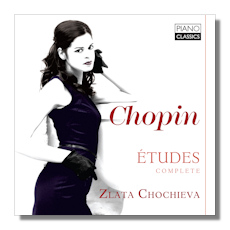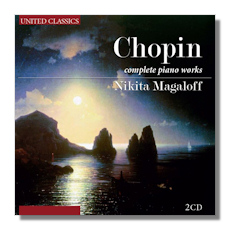
The Internet's Premier Classical Music Source
Related Links
- Chopin Reviews
- Latest Reviews
- More Reviews
-
By Composer
-
Collections
DVD & Blu-ray
Books
Concert Reviews
Articles/Interviews
Software
Audio
Search Amazon
Recommended Links
Site News
 CD Review
CD Review
Frédéric Chopin

Complete Études
- 12 Études, Op. 10
- 12 Études, Op. 25
Zlata Chochieva, piano
Piano Classics PCL0068 64m


The Nocturnes
- B Flat minor, Op. 9 #1
- E Flat Major, Op. 9 #2
- B Major, Op. 9 #3
- F Major, Op. 15 #1
- F Sharp Major, Op. 15 #2
- G minor, Op. 15 #3
- C Sharp minor, Op. 27 #1
- D Flat Major, Op. 27 #2
- B Major, Op. 32 #1
- A Flat Major, Op. 32 #2
- G minor, Op. 37 #1
- G Major, Op. 37 #2
- C minor, Op. 48 #1
- F Sharp minor, Op. 48 #2
- F minor, Op. 55 #1
- E Flat Major, Op. 55 #2
- B Major, Op. 62 #1
- E Major, Op. 62 #2
- E minor, Op. 72 #1
- C Sharp minor, Op. Posth.
- C minor, Op. Posth.
Nikita Magaloff, piano
United Classics T2CD2013024 2CDs 63m + 60m
Russian pianist Zlata Chochieva (b. 1985, Moscow), a student of Mikhail Pletnev and graduate of the Moscow State Conservatory in 2012, has won numerous international piano competitions. Despite her youth, her keyboard style divulges a sense of maturity in the Chopin etudes, a maturity supported by an arsenal of natural talent, good instincts and superior intelligence.
Chochieva displays an excellent grasp of Chopin's subtle weaving of melodies with harmonies and rhythms. In almost every one of these etudes she deftly captures the essential character of the music, tending to shun temporary effects in favor of harnessing the overall emotional and intellectual climate of the piece. She uses the pedal most effectively, whether discreetly or liberally, and has wide ranging dynamics. Try her lovely account of #3 in E Major, Op. 10, where the main theme sings beautifully: notice the velvety tones she achieves through many gradations of dynamics and deft use of the pedal. Also, try #3, in F Major, Op. 25, where she delivers a leisurely but charming performance. The ensuing Etude in A minor is played with a more staccato touch and is brilliantly colorful in its jaunty romp. Her Black Keys Etude (#5, in G Flat Major, Op. 10) ripples with virtuosity yet never sounds rushed or overdone in its playful joy.
Chochieva doesn't shortchange the darker side of Chopin: try the inconsolable #6, in E flat minor, Op. 10, where the pervading gloom is delivered with a flowing mesmerism in Chochieva's perfect pacing and velvety touch. Chochieva turns in a gentle, subtle account of #1, in A Flat Major, Op. 25. In fact, in many pieces that other pianists either rush or play too loudly, she shows tasteful restraint and a seemingly perfect sense for the right tempo: try #5, in E minor, Op. 25, for an imaginative and utterly arresting performance from first note to last. I'll write ditto for the ensuing G Sharp minor Etude. Chochieva plays the octaves in the outer sections of #10, in B minor, Op. 25, with a perfect sense for the music's grimness and desperation, and the middle section comes across with a melting peacefulness. A great performance! The Winter Wind Etude, (#11, Op. 25) gets an effectively stately yet stormy treatment from Chochieva. The Trois Nouvelles Etudes are also brilliantly played by her, and I must declare that among young pianists I have heard in recent years, she would seem to be among the most talented and likely to have a major career. Excellent sound reproduction from Piano Classics. Chochieva has made at least three other recordings, which feature a range of repertory from Domenico Scarlatti sonatas to Rachmaninov's rarely heard First Sonata and Prokofiev's popular Seventh.
Speaking of Rachmaninov and Prokofiev, Nikita Magaloff knew both of them and took composition lessons from the latter in Paris. Magaloff (1912-1992) was a Russian-born pianist of Georgian parentage who wasn't afraid to take interpretive risks or adopt what many regarded as an unsentimental approach. Settling in Paris, he developed a cosmopolitan style and had the distinction to be the first pianist to record all of Chopin's piano works. Also, he regularly performed the complete Chopin solo output in a series of six recitals.
These Nocturnes were recorded in 1974 at the Concertgebouw, Amsterdam, but the sound is very clear and detailed. They were part of the complete set of Chopin works which Magaloff recorded from 1974-1978 for Philips. Listening to the B Flat minor First Nocturne, you'll wonder why some called Magaloff unsentimental or cold in his interpretive approach. He is very sensitive to the lush lyricism in this lovely piece, and plays it with a quite deliberate tempo. The ensuing two nocturnes also exhibit the same kind of tenderness and attention to detail. Magaloff's dynamics feature many gradations, though if he has a fault it may be that at times he tends to favor potent dynamics, tending toward mezzo-forte rather than the softer end of the spectrum. Try #4, in F Major, and #5 in F Sharp Major, where the softer sections sound a tad strong in the upper register. Still, this is rarely a problem, especially when taken within the context of his mostly clear-textured interpretations. #7, in C Sharp minor, is another gem here: the outer sections are lovingly played and the middle section is stormy and powerful.
Magaloff's account of the G Major Twelfth is charming in its gracefulness and serenity: the big dreamy theme at the heart of the piece gorgeously rises to the heavens, or so it seems. The E Flat Major Sixteenth has a mesmerizing beauty here, and the E minor Nineteenth is arresting in its quasi-funereal character. Overall Magaloff's tempos are moderate to slow, though he rarely sounds too slow here. True, the C minor Thirteenth and F minor Fifteenth might sound more effective at a slightly livelier tempo, but many listeners may well find the pacing very much to their liking. As I mentioned, the sound is very clear, quite competitive with many of the better discs of today. This is an excellent collection of the Chopin Nocturnes and will appeal to most listeners, especially if they prefer more thoughtful and measured interpretations.
Copyright © 2014, Robert Cummings





















